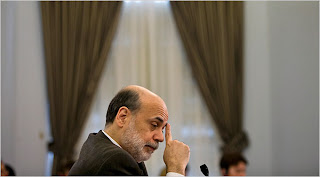Courtesy of Jr. Deputy Accountant
Gone is the quiet brainiac who quietly sat by pulling strings while the economy fell apart, the gentle professor with a neckbeard and bad taste in socks. The new Zimbabwe Ben is a desperate hack lashing out at any and everyone who dares question his all-seeing wisdom when it comes to fixing America’s terminally broken economy.
But while ZB has been busy trying to manufacture liquidity the system doesn’t need, he’s also been just as busy exporting inflation to the rest of the world. Those made-up blips that we don’t count as "money" might just be money after all.
According to the World Bank, food prices in mid to low income countries around the world are up 29% from last year. That doesn’t have Bernanke written all over it, surely.
.jpg) It looks like some kind of memory loss is setting in for old Gentle Ben now that he’s coasting towards 60, he conveniently left out the part about those capital inflows being forced upon us by A) our insatiable need for cheap Chinese crap and B) the fact that we paid them in Treasurys. So whose fault is that?
It looks like some kind of memory loss is setting in for old Gentle Ben now that he’s coasting towards 60, he conveniently left out the part about those capital inflows being forced upon us by A) our insatiable need for cheap Chinese crap and B) the fact that we paid them in Treasurys. So whose fault is that?
Check out Global Imbalances: Links to Economic and Financial Stability. As Economic Populist pointed out, it’s easy to chop this up into digestible pieces that prove one’s point but better to read it in its entirety and then judge ZB for his asinine comments. As per usual.
The bottom line is that he’s pissed that the jig is up. That’s it.
[T]he United States–the recipient of the largest capital inflows in the world–has also faced challenges coping with capital inflows. Notably, the failures of the U.S. financial system in allocating strong flows of capital, both domestic and foreign, helped precipitate the recent financial crisis and global recession.
Why was the United States, a mature economy, the recipient of net capital inflows that rose to as much as 6 percent of its gross domestic product prior to the financial crisis? A significant portion of these capital inflows reflected a broader phenomenon that, in the past, I have dubbed the global saving glut. Over the past 15 years or so, for reasons on which I have elaborated in earlier remarks, many emerging market economies have run large, sustained current account surpluses and thus have become exporters of capital to the advanced economies, especially the United States. These inflows exacerbated the U.S. current account deficit and were also a factor pushing U.S. and global longer-term interest rates below levels suggested by expected short-term rates and other macroeconomic fundamentals.
Really? "The global saving glut?" (see his 2005 speech to the Virginia Association of Economists here) It’s really cute that ZB wants to flaunt his homemade terms but he needs a good dose of reality here, one that shouldn’t be too foreign to him. If he knows anything, it’s macro. But it doesn’t take a macroeconomic rocket scientist to figure out that we did this to ourselves by demanding more cheap crap from overseas, all while shipping our infrastructure over there to keep pumping it out cheaper. I’m baffled as to why this seems beyond his comprehension.
In his speech, Bernanke also seems to fault investors for choosing to park their cash in safe and always-available Treasurys. Are you kidding me? Is he protective of Treasurys now that he’s the #1 buyer?
Knowing we’re watching, though, he quickly backs out of pointing fingers:
To be clear, these findings are not to be read as assigning responsibility for the breakdown in U.S. financial intermediation to factors outside the United States. Instead, in analogy to the Asian crisis, the primary cause of the breakdown was the poor performance of the financial system and financial regulation in the country receiving the capital inflows, not the inflows themselves. In the case of the United States, sources of poor performance included misaligned incentives in mortgage origination, underwriting, and securitization; risk-management deficiencies among financial institutions; conflicts of interest at credit rating agencies; weaknesses in the capitalization and incentive structures of the government-sponsored enterprises; gaps and weaknesses in the financial regulatory structure; and supervisory failures.
Naturally.
However you look at it and no matter how many times you read it, it’s clear that he’s sweating under the hot lights and hoping someone – anyone – will buy this while he still has time to make it right and get us back on track for sustainable debt production. Because let’s be real about it, that’s really his only job.
Here’s what I vote: every time the Fed buys x amount of Treasury debt on its way to meeting that $600 billion QE 2 target, China should sell the same exact amount. That will keep things on a level playing field. Isn’t that what this speech is all about?



